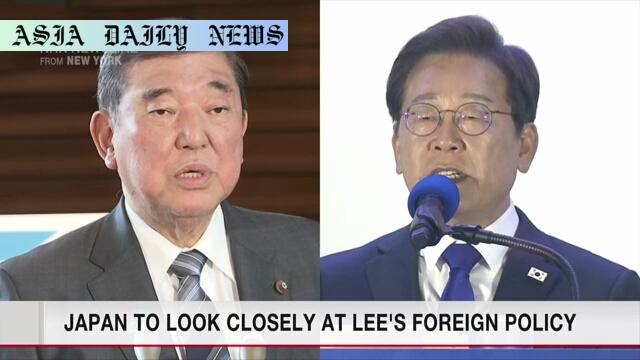Japan-South Korea relations: The Japanese government plans to cautiously study new South Korean President Lee Jae-myung’s foreign policy approach.
Japan aims to evaluate the foreign policy of new South Korean president Lee Jae-myung.
Lee pledges collaboration with Japan and the U.S. on regional security.
Concerns persist over Lee’s historically tough stance toward Japan.
Efforts are underway to arrange a summit for dialogue and cooperation.

Understanding the New Dynamic Between Japan and South Korea
The election of South Korean President Lee Jae-myung marks a significant shift in East Asian geopolitics, with Japan paying close attention to his foreign policy agenda. As a candidate of the Democratic Party, Lee’s campaign emphasized fostering cooperation with Japan while maintaining strong ties with the United States. However, Lee’s past criticism of Japan on historical and bilateral disputes raises concerns in Tokyo. This complex mix of opportunities and challenges sets the stage for a pivotal moment in relations between the two nations.
President Lee’s Approach to Regional Security
Regional security in East Asia remains a critical concern, particularly in light of North Korea’s expanding nuclear capabilities and the strategic competition between China and the United States. President Lee has voiced a commitment to strengthen trilateral cooperation with Japan and the United States to address these challenges. This pledge aligns with Japan’s goal of fostering a stable and collaborative relationship that contributes to regional peace. However, Lee’s ability to navigate domestic pressures and balance cooperation with a country he has previously criticized will be closely monitored by Japanese officials.
Challenges of Historical Disputes
Historical disputes, including issues related to wartime labor and territorial disagreements, remain a significant barrier to Japan-South Korea relations. President Lee has previously taken a firm stance on these matters, suggesting that these unresolved issues may cause friction in bilateral dealings. Japan, on its part, is seeking ways to build on the momentum of improved ties that began under former President Yoon Suk-yeol. Clear communication and mutual respect for sensitive historical concerns will be pivotal in achieving a balance between progress and reconciliation.
The Role of Future Summits
Japan is already making efforts to establish dialogue with the new administration by arranging a summit between Prime Minister Ishiba Shigeru and President Lee. This initiative presents an opportunity for both leaders to set a new tone for their countries’ relations while addressing pressing regional and bilateral issues. Such summits can facilitate confidence-building measures and serve as a platform for resolving differences constructively. It remains to be seen how President Lee’s administration will engage in these discussions, especially given his past criticism of Japan.
Implications for the Broader Global Context
The evolving relationship between Japan and South Korea carries broader implications for global diplomacy. Both nations are pivotal players in East Asia, with shared interests in maintaining stability amidst challenges such as China’s growing influence and North Korea’s nuclear ambitions. President Lee’s foreign policy will shape not only the bilateral dynamic but also the strategic alignment of U.S. allies in the region. A collaborative approach between Tokyo and Seoul could strengthen the region’s security framework and contribute positively to the global order.
Conclusion
The Japanese government’s cautious approach toward evaluating President Lee Jae-myung’s foreign policy reflects both optimism and apprehension. While the prospects for increased collaboration on regional security are promising, historical grievances and Lee’s past criticisms present challenges that cannot be overlooked. By focusing on open dialogue and sustained engagement, Japan and South Korea have the opportunity to redefine their relationship and contribute to a more stable East Asia. Whether this potential can be realized will depend on the willingness of both sides to prioritize mutual interests and overcome historical animosities.



Commentary
Welcoming New Leadership with Optimism and Caution
The transition of power in South Korea with the election of President Lee Jae-myung ushers in a new chapter for Japan-South Korea relations. This shift comes at a time when East Asia faces complex challenges, from North Korea’s provocations to the intensifying U.S.-China rivalry. Japan’s approach to cautiously study President Lee’s foreign policy reflects a pragmatic stance—one that seeks to minimize potential setbacks while capitalizing on opportunities for collaboration.
Balancing Regional Security and Historical Disputes
Regional security has emerged as the linchpin of cooperation between Japan and South Korea, and President Lee’s pledge to strengthen trilateral ties with the United States is a positive step. However, historical issues that have long soured relations between Tokyo and Seoul cannot be ignored. Navigating these sensitive issues will demand exceptional diplomatic skill and patience from both governments. Failure to address these concerns in a balanced and constructive way risks derailing progress on other fronts.
A Platform for Constructive Dialogue
The anticipated summit between Prime Minister Ishiba Shigeru and President Lee offers a crucial platform for setting the tone of their bilateral relationship. This meeting is not merely symbolic; it represents a tangible opportunity to rebuild trust and outline a shared vision for the future. However, the success of such dialogues hinges on the ability of both leaders to rise above past grievances and focus on shared interests such as economic growth, technological cooperation, and regional stability.
Final Thoughts: A Time for Strategic Diplomacy
Japan and South Korea stand at a crossroads in their bilateral relations. With President Lee Jae-myung at the helm, there is potential for both collaboration and conflict. The path forward will depend on the strategic choices made by both nations in the coming months. By fostering open communication and prioritizing regional stability, Japan and South Korea can pave the way for a more resilient and cooperative East Asia.